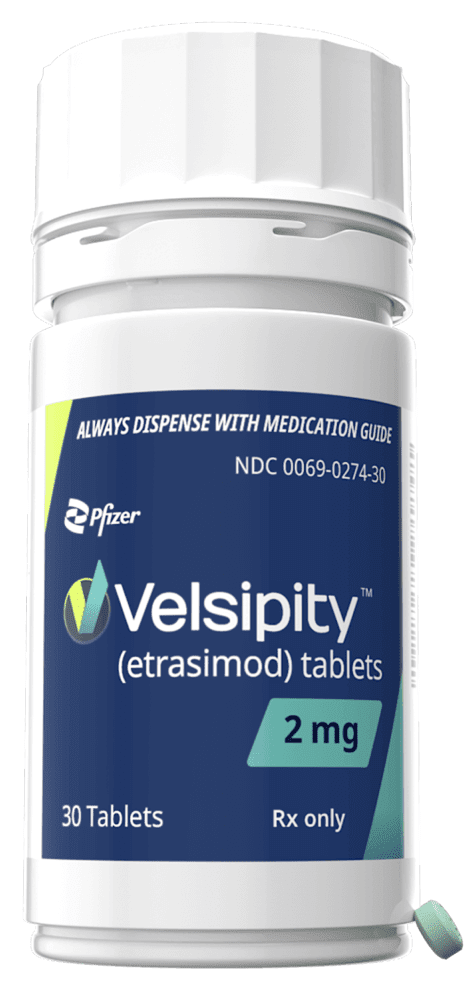Velsipity Disease Interactions
There are 4 disease interactions with Velsipity (etrasimod).
Etrasimod (applies to Velsipity) heart disease
Major Potential Hazard, Moderate plausibility. Applicable conditions: Cardiovascular Disease
Etrasimod is contraindicated in patients who have experienced in the last 6 months myocardial infarction, unstable angina pectoris, stroke, transient ischemic attack, decompensated heart failure requiring hospitalization, and Class III or IV heart failure. It is also contraindicated in patients with history of Mobitz type II second or third-degree atrioventricular (AV) block, sick sinus syndrome, or sino-atrial block, unless the patient has a functioning pacemaker. Advice from a cardiologist should be sought if treatment is being considered in patients with significant QT prolongation, arrhythmias requiring treatment with Class Ia or Class II anti-arrhythmic drugs or QT prolonging drugs, unstable ischemic heart disease, Class I or III heart failure, history of cardiac arrest, cerebrovascular disease, uncontrolled hypertension, resting heart rate less than 50 beats per minute, symptomatic bradycardia, recurrent cardiogenic syncope, severe untreated sleep apnea, history of Mobitz type I second degree AV block, unless the patient has a functioning pacemaker.
References
- (2023) "Product Information. Velsipity (etrasimod)." Pfizer U.S. Pharmaceuticals Group
Etrasimod (applies to Velsipity) infections
Moderate Potential Hazard, Moderate plausibility. Applicable conditions: Infection - Bacterial/Fungal/Protozoal/Viral, Vaccination
Etrasimod increases the risk of infections as it decreases the peripheral lymphocyte counts. Treatment initiation should be delayed in patients with an active infection until the infection is resolved. Patients without a confirmed history of varicella (chickenpox), or without documentation of a full course of vaccination against varicella zoster virus, should be tested for antibodies before initiating treatment. Avoid the use of live attenuated vaccines during and for up to 5 weeks after treatment.
References
- (2023) "Product Information. Velsipity (etrasimod)." Pfizer U.S. Pharmaceuticals Group
Etrasimod (applies to Velsipity) liver dysfunction
Moderate Potential Hazard, Moderate plausibility. Applicable conditions: Liver Disease
Elevations of transaminases have been reported in patients receiving etrasimod. Additionally, this drug undergoes extensive hepatic metabolism, and its exposure was found increased in subjects with severe hepatic dysfunction (Child-Pugh C). The use of etrasimod is not recommended on these patients. No dosage adjustment is needed in mild to moderate hepatic dysfunction.
References
- (2023) "Product Information. Velsipity (etrasimod)." Pfizer U.S. Pharmaceuticals Group
S1P modulators (applies to Velsipity) malignancies
Moderate Potential Hazard, Moderate plausibility. Applicable conditions: Skin Cancer
Cases of malignancies, including skin malignancies have been reported in patients treated with some sphingosine -1-receptor (S1P) receptor modulators. Skin examinations are recommended prior and during treatment in all patients, particularly in those with risk factors for skin cancer. Suspicious skin lesions should be promptly evaluated, and patients at increased risk should wear protective clothing and use sunscreen with high protection factor.
References
- (2010) "Product Information. Gilenya (fingolimod)." Novartis Pharmaceuticals
- (2019) "Product Information. Mayzent (siponimod)." Novartis Pharmaceuticals
- (2023) "Product Information. Velsipity (etrasimod)." Pfizer U.S. Pharmaceuticals Group
Velsipity drug interactions
There are 702 drug interactions with Velsipity (etrasimod).
Velsipity alcohol/food interactions
There is 1 alcohol/food interaction with Velsipity (etrasimod).
More about Velsipity (etrasimod)
- Velsipity consumer information
- Check interactions
- Compare alternatives
- Pricing & coupons
- Drug images
- Side effects
- Dosage information
- During pregnancy
- FDA approval history
- Drug class: selective immunosuppressants
- Breastfeeding
- En español
Related treatment guides
Drug Interaction Classification
| Highly clinically significant. Avoid combinations; the risk of the interaction outweighs the benefit. | |
| Moderately clinically significant. Usually avoid combinations; use it only under special circumstances. | |
| Minimally clinically significant. Minimize risk; assess risk and consider an alternative drug, take steps to circumvent the interaction risk and/or institute a monitoring plan. | |
| No interaction information available. |
Further information
Always consult your healthcare provider to ensure the information displayed on this page applies to your personal circumstances.


